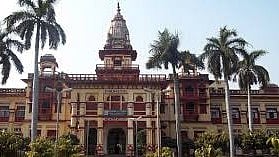BHU Hosts Faculty Development Programme To Boost Women Entrepreneurship Under Swavalambini Initiative
The programme, organised by the National Institute for Entrepreneurship and Small Business Development (NIESBUD) under the Ministry of Skill Development and Entrepreneurship (MSDE), Government of India, the programme aims to build the capacity of faculty members to mentor and guide students in entrepreneurship.

Banaras Hindu University (BHU) | BHU official website
Varanasi (Uttar Pradesh): The Faculty Development Programme (FDP) under the Swavalambini Women Entrepreneurship Programme was inaugurated on Monday at the Atal Incubation Centre (AIC) at Banaras Hindu University (BHU).
About The Programme
The programme, organised by the National Institute for Entrepreneurship and Small Business Development (NIESBUD) under the Ministry of Skill Development and Entrepreneurship (MSDE), Government of India, the programme aims to build the capacity of faculty members to mentor and guide students in entrepreneurship.
The inaugural ceremony commenced with the lighting of the ceremonial lamp by Prof. Ashish Bajpayee, Director, Institute of Management Studies, BHU; Prof. Manish Arora, Head, Department of Applied Arts and Coordinator, Design Innovation Centre, BHU; and Dr. Saurabh Chandrashekharan, Programme Director, NIESBUD, along with other distinguished faculty members and participants.
Delivering the inaugural address, Prof. Ashish Bajpayee highlighted the equal contributions of women and men to society. He emphasised that knowledge must be valued for enabling action-oriented approaches, rather than merely for the sake of certification. He remarked, "We don't choose a goal; we choose a habit. The habits we choose ultimately shape our goals. Habits, in turn, are shaped by our thinking and programmes like these help nurture that thinking." Prof. Manish Arora outlined the programme's objectives, the government's vision for entrepreneurship, and the crucial role of academic institutions.
He introduced the activities of the Design Innovation Centre (DIC), BHU and the facilities of the Atal Incubation Centre (AIC), emphasising the government's consistent efforts in promoting entrepreneurship and design thinking as enablers of business growth. He also briefed participants on the Atal Innovation Mission, the incubation process, and facilities such as BioNEST for biotechnology research, while elaborating on BHU's broader innovation ecosystem and government-supported schemes.
He also briefed participants on the programme outline. Prof. Arora stressed that the government is consistently working to promote innovation and entrepreneurship, and BHU must play a pioneering role in this direction.
Dr Saurabh Chandrashekharan, Programme Director, NIESBUD, provided a detailed orientation on the Swavalambini Women Entrepreneurship Programme and the wider initiatives of the Ministry of Skill Development and Entrepreneurship (MSDE).
He underlined the pivotal role of faculty members as the first mentors who can inspire students to explore entrepreneurship as a viable career path. He highlighted how Swavalambini seeks to institutionalise entrepreneurship through structured interventions in higher education, with a strong focus on women's empowerment.
He also elaborated on NIESBUD's role in designing and implementing entrepreneurship programmes, building the capacity of trainers and institutions, and providing post-training mentoring support to aspiring entrepreneurs. The Micro Lab session was conducted.
In the post-lunch session, Amanvita Rakshit, Head, Centre of Innovation, Faculty of Agricultural Sciences, BHU, conducted a technical session on 'Entrepreneurial Motivation through Techniques and Behavioural Strategies.' He introduced methods to strengthen entrepreneurial motivation, including gamification, recognition systems, role models, storytelling, case studies, simulations, and visual engagement. A four-level capacity-building framework was shared, covering personal (motivation, workshops, journaling), institutional (curriculum integration, incubation support), community (hackathons, local problem-solving), and policy (incentives, funding schemes) dimensions.
Rakshit emphasised the importance of initiative and resilience, urging BHU to strive not only for academic excellence but also for leadership in entrepreneurship rankings. He called on educators to shift mindsets, celebrate effort, and foster ownership and initiative among students.
ALSO READ
The session concluded with an interactive Q&A segment.
The day also featured a talk by Dinesh Maurya, Founder of Urban Dairy and Sansaar Nursery, who shared his entrepreneurial journey in the agribusiness sector. His real-life insights provided participants with practical perspectives on rural enterprise development.
The first day of the programme concluded with a reminder of Peter Drucker's words: "Entrepreneurship is neither a science nor an art. It's a practice."
(Except for the headline, this article has not been edited by FPJ's editorial team and is auto-generated from an agency feed.)
RECENT STORIES
-
-
-
-
-